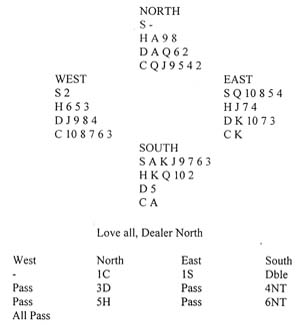|
Bridge
 RON
Klinger tells me of this striking deal from the South West Pacific
Teams. North-South were playing negative (take-out) doubles of
overcalls, so South either had to pass — hoping that his partner would
re-open with a take-out double that could be passed — out begin with a
negative double. West led the two of spades against 6NT and declarer won
East’s queen with the ace. If clubs were 3-3 or 4-2 with the ten
falling, declarer would have twelve tricks. When he cashed the ace of
clubs the king fell singleton. This would normally be good news. Not
here because West’s remaining 10-8-7-6 gave him a double stopper.
Declarer finessed the queen of diamonds but East won with the king. All
now depended on East’s return. A heart or a diamond would, as it
happens, beat the contract. East could not believe that declarer had
seven spades, however, and therefore read his partner’s lead as being
from three to an honour. East returned a spade and declarer was able to
finesse the nine. When the heart suit provided four tricks the slam was
made. ‘Plus 990,’ announced South at the comparison. ‘Three IMPs
away,’ his team mate replied. ‘I was in IS doubled, losing 1100!’ RON
Klinger tells me of this striking deal from the South West Pacific
Teams. North-South were playing negative (take-out) doubles of
overcalls, so South either had to pass — hoping that his partner would
re-open with a take-out double that could be passed — out begin with a
negative double. West led the two of spades against 6NT and declarer won
East’s queen with the ace. If clubs were 3-3 or 4-2 with the ten
falling, declarer would have twelve tricks. When he cashed the ace of
clubs the king fell singleton. This would normally be good news. Not
here because West’s remaining 10-8-7-6 gave him a double stopper.
Declarer finessed the queen of diamonds but East won with the king. All
now depended on East’s return. A heart or a diamond would, as it
happens, beat the contract. East could not believe that declarer had
seven spades, however, and therefore read his partner’s lead as being
from three to an honour. East returned a spade and declarer was able to
finesse the nine. When the heart suit provided four tricks the slam was
made. ‘Plus 990,’ announced South at the comparison. ‘Three IMPs
away,’ his team mate replied. ‘I was in IS doubled, losing 1100!’
 What would you rebid
on the West cards? What would you rebid
on the West cards?
Answer
An overcall of INT
promises a strong hand, somewhere in the 16-18 range. This expresses the
hand better than a take-out double. Some players would prefer to pass
for the moment but nowadays it is commonplace for the opponents to open
on 10 or 11 and respond on 5. There is no reason at all why you should
not have game your way.
Awards: INT-10, Dble-7,
Pass-6.
David Bird
— Knight Features
|